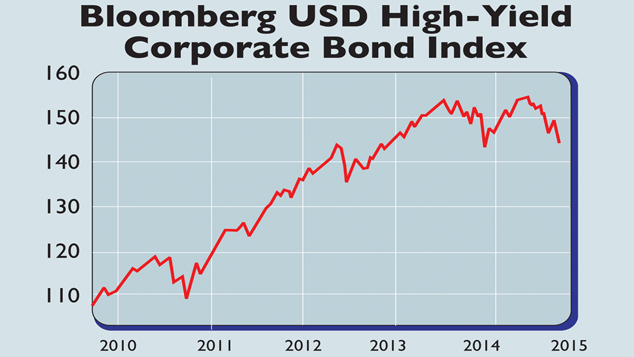Vultures start to circle corporate bonds
Since the financial crisis, record-low interest rates and printed money have inflated a bubble in corporate borrowing. Now it’s leaking air.

Get the latest financial news, insights and expert analysis from our award-winning MoneyWeek team, to help you understand what really matters when it comes to your finances.
You are now subscribed
Your newsletter sign-up was successful
Want to add more newsletters?

Twice daily
MoneyWeek
Get the latest financial news, insights and expert analysis from our award-winning MoneyWeek team, to help you understand what really matters when it comes to your finances.

Four times a week
Look After My Bills
Sign up to our free money-saving newsletter, filled with the latest news and expert advice to help you find the best tips and deals for managing your bills. Start saving today!

"Every party has to end," says The Wall Street Journal. Since the financial crisis, record-low interest rates and printed money have inflated a bubble in corporate borrowing. But now it's leaking air. In the first nine months of 2015, non-financial firms across the globe issued a record $1.38trn in investment-grade debt. The American figure was also a record: $570.4bn. In total, US firms have $7.8trn in debt. Around $2.5bn is "junk" riskier debt from those with lower credit ratings. Such bonds now trade on single-digit yields (yields fall as prices rise) due to their popularity last year, investors scooped up $312bn of junk, compared to $146bn at the last peak in 2006.
The cycle turns
The yield on corporate debt is always higher than on government bonds, reflecting the extra default risk the "credit spread". Now spreads are widening, and the gap between the best corporate paper and riskier debt is also rising. Spreads for the lowest-level US investment-grade bonds, rated BBB, are at their highest for this cycle.
The spread between triple-B and double-B, the top end of the junk market, is at a six-year high. And this isn't limited to troubled sectors such as oil and mining. Already, more American companies have defaulted than at any time since 2009, with Quiksilver, the surfwear retailer, a notable casualty, say Eric Platt and Nicole Bullock in the Financial Times.
MoneyWeek
Subscribe to MoneyWeek today and get your first six magazine issues absolutely FREE

Sign up to Money Morning
Don't miss the latest investment and personal finances news, market analysis, plus money-saving tips with our free twice-daily newsletter
Don't miss the latest investment and personal finances news, market analysis, plus money-saving tips with our free twice-daily newsletter
So far the default rate on high-yield debt is well below the historical average, and there has not yet been an investment-grade default. But the proportion of US bonds deemed "distressed" those with a yield that's at least 10% higher than government debt is at a four-year high. What's more, $1.5trn of corporate debt has to be refinanced in 2016 and 2017. And American firms may have trouble servicing their debt once earnings fall or interest rates rise: JPMorgan reckons that 62% of firms have twice as much debt as cash flow from operations, up from 31% in 2006.
Stresses emerge
The good news is that foreign-currency debt accounts for just 5% of the total, says investment manager T. Rowe Price, so the squeeze as falling local currencies make foreign debts more costly should be limited. But the emerging-market slowdown, notably in commodities, will push junk defaults up to 5.4% this year from 3.2% in 2014, estimates JPMorgan. And if US rates rise, money may continue to leave emerging markets.
The size of the corporate debt bubble hints at turbulence when it bursts. It doesn't help that bond-market liquidityis lower than usual as a side-effect ofnew banking regulations. Rising credit spreads aren't a foolproof sign of a recession, says The Economist's Buttonwood columnist. But financial stresses are emerging. "One swallow does not make a summer. But the sudden appearance of a vulture circling overhead ought to raise serious concerns."
Get the latest financial news, insights and expert analysis from our award-winning MoneyWeek team, to help you understand what really matters when it comes to your finances.

-
 Should you get financial advice when organising care for an elderly relative?
Should you get financial advice when organising care for an elderly relative?A tiny proportion of over 45s get help planning elderly relatives’ care – but is financial advice worth the cost?
-
 Should you buy an active ETF?
Should you buy an active ETF?ETFs are often mischaracterised as passive products, but they can be a convenient way to add active management to your portfolio